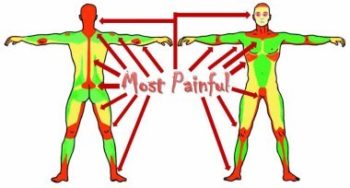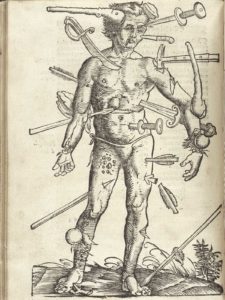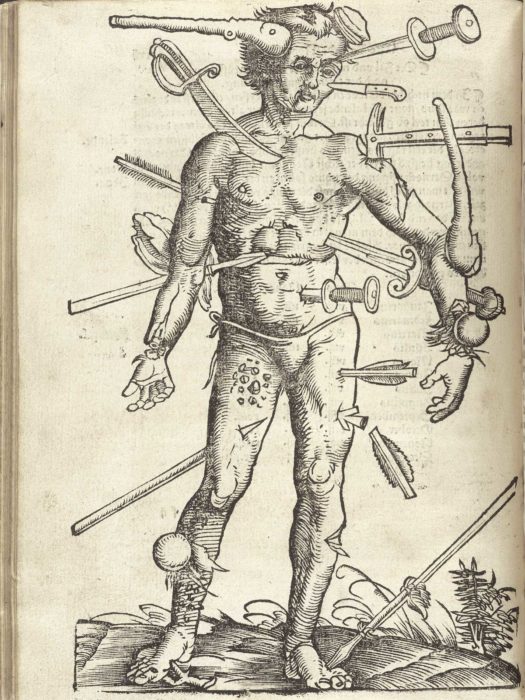Speculative Fiction Writer’s Guide to War Special: How do War Injuries Feel?
This post is inspired by a specific question from one of the readers of this series (Autumn Grayson). The nature of the question is worthy of a specific answer, yet this particular topic was not something Travis Chapman and I had planned to cover. I spent some time trying to plan where to incorporate it in what we already planned to say, but in fact the best place to discuss how war injuries feel has already passed (it would have gone well with the discussion of psychological effects of warfare). So I’m going to address this issue now, out of numerical order from the rest of our series.
First, let’s make a few things clear up front: 1. What is most life threatening and what is most painful are often not the same thing at all. 2. What is the most gruesome to see is not necessarily the most painful, either. 3. Different people experience pain differently, so coming up with any absolute scale of painfulness is impossible. However, there are certain tendencies that have been noted in how people react to pain, allowing us to make some general observations. Let’s take the topic of how different people experience pain first.
Note this discussion will become a bit gruesome, though I’m not going to show any graphic pictures. But if you’re of a very sensitive nature, you may not wish to continue reading.
Pain Tolerance
“Pain threshold” refers to whether a person feels pain at all–and in fact not all human beings are the same on this topic. Though most of us are similar, barring neurological disorders that interfere with feeling pain. What varies a great deal more than pain threshold is “pain tolerance”–that is, the degree to which a person can put up with pain after agreeing that it’s there.
Some observations include the somewhat controversial notion that men tolerate pain better than women. That is, for the same injury, when rating how painful it is on a scale of 1 to 10, men in the United States in particular and in various international studies will rate the pain with lower numbers than women will use. Cold bath tests, in which someone immerses an arm in ice water (which is painful but does no serious harm) consistently shows men on average keeping their arms immersed in the cold for longer periods of time than women will tolerate.
How much of this is cultural, male machismo merely refusing to admit to pain that they feel as much as women do? That’s both debatable and debated. My own personal observations from the 12 years or so I was a medic in the Army Reserve and periodically would treat people, in particular with vaccinations, or would draw blood for testing, is that among soldiers (not the general populace) women were more likely to complain about the pain of a needle. Though some individual women didn’t complain or even flinch at all, while some individual men kicked up quite a fuss.
It’s not uncommon for women to point out that if men had to give birth, there’d be a lot less children in the world. 🙂 But direct comparisons between similar conditions, such as a woman having kidney stones verses a man having kidney stones, does not actually support the idea that men would be inherently less capable of managing the type of pain associated with childbirth.
In some cases the difference in pain tolerance is clearly physical. People with a definite hand dominance (a group which includes most people) show a higher resistance to pain in their dominant hand than their non-dominant hand. I’d also put in the category of physical differences that indicates redheads seem to experience pain differently than non-redheads, with them being less sensitive to stinging skin pain and spicy food on average, but more sensitive to cold and bone pain like toothaches.
Scientific studies seem to show at least some of the differences in how people react to pain is physical, but it’s hard to rule out cultural factors. Cultural factors may explain why one study found that African Americans consistently tolerate higher levels of pain than white people.
My own observations agree with the idea that pain tolerance is at least somewhat cultural, because I’ve observed some nationalities, say Afghans–regardless of their skin color–tolerate pain much better than other nationalities (i.e. most Americans). I think the expectation of how much pain a person can and will tolerate is affected by life experience–people raised with pain in their environment usually learn to tolerate it better.
Note that scientific studies also show athletes tolerate pain better than people out of shape. This reinforces my idea that conditioning to pain as experienced in cultures with significantly lower levels of luxury than modern life actually has something to do with training the body. Perhaps the exposure to the pain involved with working out prepares people to face much greater pain. Or perhaps a healthy body (as in very fit) is inherently better at coping with pain than an body that’s out of shape.
Related perhaps to our observation about athletes and/or cultural exposure to pain, psychologists have also observed that a state of anxiety can make pain worse. People with chronic fear or anxiety will experience pain more deeply than someone who feels confident and who deliberately relaxes during pain (such as by focusing on breathing, as is taught as a method to assist with childbirth).
One general observation we can apply to this discussion, especially since many readers of Speculative Faith are fantasy authors: We can expect people from cultures like our own Middle Ages or Ancient period to have higher pain tolerance than most people today have. Of course, this wouldn’t apply to absolutely everyone. While medieval peasants, the vast majority of people, might live with pain in a way most modern people can’t imagine very well, not everyone was a peasant–or a highly trained warrior either. The Middle Ages had monks and scribes and tailors, etc., whose reaction to pain probably would be more like a modern person’s than the majority of people from their own time.
Most Painful Wounds
To kick off this section, I’m linking a website that get’s what’s painful largely wrong. (I’m doing so as a means to discuss why the site has it wrong.) The linked set of pages, which are dedicated to the kinds of injuries found in horror movies, appears to be listing injuries based on what is horrible to watch on film, rather than what really hurts. In a counting-down-from-ten format, this is what the site lists as the ten most painful injuries:
TEN (10.) Burning, 9. Slit throat, 8. Eye gouge, 7. Removal of entrails, 6. Fingers sliced off, 5. Broken bones, 4. Amputation, 3. Meat hooked, 2. Genital mutilation, 1. Achilles slash
I’m not saying there isn’t some painful stuff on this list, but what’s wrong is it misses the general principle of what makes something painful–an injury is most painful if it stimulates nerves. The more nerves it continuously stimulates, the more painful it is. So injuries in places with a high number of sensory nerves are more painful than those without as many nerves. Yet the way they’re stimulated also matters.
So where do you have a lot of nerves? Your skin (in particular in your hands and feet), your face (in particular your mouth, nose, and eyes), your entrails, your kidneys, and even within your joints and bones. You have very few receptor nerves, ironically, within your brain cavity and not nearly as many in your chest cavity as elsewhere–though your lungs have a fair number of pain receptors. Nor do you have as many pain receptors within your muscles. So injuries to your brain or chest-located-circulatory system, which are the most life-threatening injuries, are not usually the most painful.

Most painful tattoo sites due to nerve clusters in the skin. Credit: www.beforeyourtattoo.com
And what stimulates those nerves the most? Clean slices, believe it or not, stimulate nerves the least of any major injury. What hurts more is smashing, a.k.a blunt force trauma, mangling (as in an explosion or t-rex bite), and yes, burning!
So looking back at the list I cited, burning deserves to be near the top. Note though that a complete, charring burn, as from dragon’s breath (also called third degree burns), while very painful over the short time of injury and during the road to recovery (should the victim survive), these burns don’t hurt as much as those that produce blisters (a.k.a. second degree burns). So, if writing about a fortress being attacked and boiling oil is dumped on a band of attackers, have them scream in pain–even hardened medieval types will almost certainly do so. It hurts that bad.
What doesn’t deserve to be on the list at all? Slit throat, fingers sliced off, and amputation…assuming a person receives these injuries cleanly. Smashing or crushing fingers hurts tremendously (as the time I got my thumb caught in a car door) because you have plenty of nerves in your fingertips. Smashing or stimulating with blunt trauma hurts your throat quite a lot too (as in the time I literally ran full speed into a clothesline and caught it in the neck–playing hide and go seek in the dark as a teen). But a clean slice to the throat probably wouldn’t hurt that much. Note I lost a finger to an accidental amputation as a child. While I was freaked out by the blood, I felt hardly any pain. No kidding.
Likewise a broadsword swiping through a limb and slicing it clean off will not produce all that much pain–especially for hardy medieval types. They probably would not scream at all at such an injury. Note that even a messy and manged amputation may not produce any screaming (I know of people losing limbs in explosions–for most of them as far as I know, they did not scream).
Ok, back to the list above. Will an eye gouge really hurt? That depends. The interior of the eye is actually not full of pain-receptor nerves–but the outer part, the cornea, is. It may sound strange to say it, but certain chemicals or foreign bodies in your eye probably hurts at least as bad, if not worse, as your whole eye being destroyed. If someone gouged your eyeball out of your skull (sorry for the gruesomeness) without scratching the cornea, it might actually not hurt that bad–even if it would be horrible to see. Yet corneal scratches are very painful–because that’s where the nerves are. (So a skilled archer shooting an enemy through the eye probably will not get him screaming–he’ll probably just die–but if he doesn’t die, he probably won’t scream about it.)
How about removal of entrails? The entrails themselves are loaded with pain nerves (as needed to let you know how your digestion is going), so injuries to entrails are well-known to be very painful. Yet being disemboweled without injury to the entrails isn’t as much painful as it’s horrifying and debilitating. Someone with a gut sliced open with a slashing sword will more likely try to hold the guts in or pick them up if they’ve hit the ground than scream helplessly.
Do broken bones hurt? Yes, they do, especially a broken femur (the long bone in your thigh) in part because strong muscles pull on the femur constantly without you being aware of it and if the bone breaks, those muscles are going to continually stimulate pain in the wound by pulling on the bone. But joint injuries infamously hurt as much or sometimes more. Especially a bad dislocation of knees, elbows, or ankles can cause as much or more pain than a bone break.
Injured tendons will also pull up into the body because of muscle tension, like a broken femur. So a ruptured Achilles tendon (which a site providing a “most painful injury” list by a professional football player puts at #2) is extremely painful. But a cleanly sliced one would be less so.
To round out the horror site list, of course “meat hooking” and genital mutilation have the potential to be very painful. The spine has loads of pain receptors and a metal rod shoved up there would hurt all those sensitive spinal disks–unless it severed the spinal cord itself, in which case, it might not hurt much at all. And while the genitals are sensitive to pleasure and also sensitive to pain, a baddie forcing your mouth open and breaking your teeth with a hammer and chisel would almost certainly hurt much, much more than genital mutilation…but when you affect a person’s genitals, there’s a psychological affect as well as a physical one.
Note that when in severe pain, one of the most common immediate reactions for a person is to shut down, either by losing consciousness or by feeling a rush of endorphins. But not everyone shuts down. There are many historical examples of injured people continuing to fight.
Combat Happenings

An illustration showing a variety of wounds from the Feldbuch der Wundarznei (Field manual for the treatment of wounds) by Hans von Gersdorff, (1517); illustration by Hans Wechtlin.
When I see combat scenes from a YouTube compilation from say, Game of Thrones (a series I don’t watch because of issues I have with some of its content), one thing I note is rather realistically, fights tend to end with big injuries, like a person stabbed through the chest. But from what I see, anyway, the severely injured person almost always cries out. Actually that doesn’t always happen with real injuries.
Sometimes people continue to fight after being seriously or fatally injured–we can say this is especially true for gunshot wounds, which sometimes soldiers report not even knowing they had until the firefight is over. But I can easily imagine someone taking an arrow to the chest and even if seriously injured, not crying out, still fighting. At least for a while.
Note also that while most medieval-style fights ended with one party being severely injured, injuries other than fatal still did happen, where people got hands or fingers smashed, noses cut off, feet spiked though, hard but non life-threatening blows to the head at times. And most of the hardened warriors of the past continued fighting through such wounds. No kidding.
Sometimes a more minor injury would lead to a major one, as a warrior lost the ability to compensate. Yes, sometimes a warrior would realistically scream when mortally injured, depending on if the wound was very painful–but it really was true that non-combatants like women and children screamed more than hardened soldiers or even tough peasants.
Sometimes people would stop fighting without crying out. For example, when people fall from being disemboweled, again, as far as I know, they wouldn’t scream so much as compulsively obsess over keeping in their guts as much as possible. People with a throat cut would put hands to their neck to try to keep the blood in, even if it couldn’t be done. People by instinct usually try to survive their injuries if they can, for example, cradling and squeezing the wrist of an amputated hand.
Usually, when busily engaged in fighting others, the wounded who fell were ignored until the active fighting was over. Historical accounts abound with anecdotes of battlefield injuries in which people lingered for hours or days before dying. I don’t think this is something fantasy stories capture very well. A certain percentage of people would bleed to death, which tends to make people feel cold and causes hyperventilation and loss of consciousness–but it’s not especially painful in and of itself.
But How Does it Feel?
I can imagine someone reading this, thankful perhaps for the info I’ve given, but still feeling dissatisfied. “But how does it feel, Travis?” I can imagine someone asking.
To go back to my own personal experience, I’ve had a number of semi-serious injuries, some of them during military training. But I’ve never been wounded in combat–even though I have been present to help people who were wounded a few times, there are only so many things I can talk about as an insider, based on what I know personally.
Though all non-combat stuff, I’ve had severe ankle sprain, a knee injury, a finger amputation, a hip injury due to a hard fall (at Army Airborne school), a corneal scratch, accidentally impaled a broken branch into my calf, chemical and non-chemical burns, and have smashed my head various times, most notably in a car accident, among other injuries. I know what those things were like for me.
How does any of that feel?
It hurts. I know that’s not helpful, but describing pain is difficult. There are many kinds. To cover any possible injury in detail the obvious thing would be seek out accounts people who have experienced the same wound you want to write about. Or something similar. But bear in mind that the same injury in two different people may not be reported in the same way. Not only does the type of wound affect how it’s felt, the type of injured individual matters, too. Not everyone feels the same thing or reacts in the same way.
If you would like to talk to me further about any injuries I’ve suffered or seen happen, please let me know in the comments below and I will do my best of accommodate. Or you might have further questions. Or perhaps a reader will have something to add to this discussion, something I forgot to mention. Please free to add your thoughts below.









































Well, this is different from war injuries, but our culture disregards women’s pain all the dang time. It often takes YEARS for women to not get blown off by doctors for their chronic pain for stuff like endometriosis or rheumatoid arthritis. People scoff at giving women birth control to help with stuff like consistently horrible PMS. The question is more like, are women more sensitive to pain, or does the culture at large just penalize women for talking about pain even if they press on as normal?
But I think the more valid theory is that people are more used to the types of pain that they experience most. It kinda reminds me of the time when my mom got worried about my grandma when she heard that Grandma took 2 Tylenol in one day, because Grandma NEVER takes more than one Tylenol in one day.
Rando thought of the day: If we relabeled birth control as “female hormone therapy” (which is not actually false advertising, because that is how it works), would clueless people get less panicky over it?
I think that would make it sound unnecessary/silly. ‘Birth control’ at least sounds useful.
I kind of think people get stereotyped based off the type of pain being discussed. There’s the joke about ‘man colds’, so men get stereotyped for being babies when it comes to getting sick or whatever. But then when it comes to actual injuries people probably assume men can take that better.
The specific type of study that shows men enduring pain better than women are non-damaging exposures to pain, like arms in ice water. Men endure such pain longer on average. It’s also based on comparing the same injuries between men and women and the rating each gender gave the pain on a scale of 1 to 10. Men as a overall group (with many individual exceptions) rate pain lower. Consistently. I also based my comments on personal observations of men vs. women receiving injected vaccinations and having blood taken.
Are women undermedicated for pain? It’s quite difficult to say because there are no solid, objective measurements of pain that allow a genuine comparison between the pain someone is in and the pain meds they receive. There are data points, but no objective scale.
I personally see the USA as a general rule as overmedicated for pain. So I’m skeptical women are particularly undermedicated. So which studies are you referencing?
I’d fire up the google machine to see if I could find it again, but this weekend has been crap for doing anything requiring an attention span. Also, I need to take out the recycling.
Very interesting, thank you 🙂 It’s sort of surprising to hear that amputation might not be that painful, since in a lot of cases it’d be cutting through bone and such, but I guess it’s the difference you mentioned about it being a clean wound or not.
Now all I need to do is learn to get over giving chars too much of a reaction to injuries. It’s become so much of a habit now, due to the way it’s portrayed in media. But it sounds like, at least when it comes to certain injuries, the horror of the situation matters more than the actual pain. I suppose there’s also a huge disparity between how much something hurts and how much people say it hurts, too. Sometimes if I bump into something I’ll randomly say ‘ow’ (in a deadpan voice) even though it didn’t hurt at all. It’s almost like my brain just acknowledging that I bumped into something. But sometimes if I stub my toe I’ll just draw in a sharp breath(though sometimes I have more of a reaction).
This article is really reminding me of different levels of squeamishness people have, too, though. I tend to filter stuff more through thought than emotion(though emotion still plays a part), so merely describing injuries doesn’t faze me at all. Sometimes I’ll feel revolted or disgusted when I actually see certain injuries on tv, but that’s more about the context than the injury itself.
Revolted or disturbed, I mean.
I was in Iraq when a gym where military people were working out was hit by a rocket, the weapon going through a small soft spot in the roof (that nobody knew about) and exploding in the gym. I was in a concrete bunker nearby.
2 people were killed and 17 wounded (by metallic shrapnel). And nobody screamed. Nobody. The loudest it got was an uninjured person shouting for help. (And I was one of many who did what we could to help.)
And there are other examples I know of too. Some (but not all) severely injured people are surprisingly silent.
I wonder if that’s partly an instinctive self preservation thing. Partially from the standpoint that it isn’t productive to scream, and partly because in a lot of cases it wouldn’t be wise for an injured being to draw attention to itself. So maybe we’re programmed to stay quiet in a lot of cases.
Yeah–though I know people typically scream with some kinds of injuries, say, bad burns or crushed digits/hands/feet, there seems to be a point where someone is injured so badly they can’t spare a scream. At least this is so for some kinds of wounds.
Yeah, though it makes sense at that point.
Eye pain is definitely the worst pain. I’ve had gallstones (with pain so bad that I was writhing on the ground), been raped (felt like being stabbed) and have actually been stabbed in the foot. None of those was a bad a getting a peice of iron in my eye that rusted. After only one day I was ready to gouge my eye out.
There is a real psychological component to pain. People react strongly to having things shoved under their fingernails (which has happened to me twice it didn’t hurt that much but the horror was worse than being stabbed) or even just being shown pictures of it.
🙁 I’m sorry all that stuff happened to you.
Now that I think about it, I remember my fifth grade teacher telling the story of what happened after she tore her cornea as a child. She said it felt like a thousand tiny needles stabbing her eye at once.
Sounds like you’ve been through some pretty terrible things–you have my empathy.
As I was doing a bit of Internet research, gallstones was listed as one of the most painful medical conditions–but it’s not a wartime injury, so I didn’t mention it.
As far as the eye was concerned, the cornea is super-sensitive to pain and the lens probably is, too. But I don’t think the retina or the deep interior of the eye has any pain receptors at all. So I think what you experienced was probably worse than having your eye pop out of your head or be totally destroyed. From what I know.
I once (while doing military training, actually) got a piece of fiberglass stuck within my eye. Day one the eye was red and irritated and I knew something was in there and I tried to get it out, not thinking of it as a big deal. Day two, after my cornea was scratched, my eye swelled up, I was in severe pain, and I had to keep both eyes closed because moving either one of them hurt tremendously. In spite of my pain-is-nothing attitude, I needed immediate medical treatment and didn’t feel normal again for about a week.
But I’d say the few times I’ve had a severe burn hurt worse. (But I didn’t have iron rusting in my eye, either!)
Good information, although I do feel you pretty close to mansplaining childbirth pain at the start of it ?
Some courage (or maybe foolishness) is involved in suggesting childbirth isn’t actually the worst pain of all possible pains, at least not always…
Reading your initial post, I sort of took your comment on childbirth as a vague joke, as well as something that helped fulfill the goal of the article(comparing different types of pain/people’s reactions to pain). I didn’t perceive it as mansplaining at all.
This is interesting and is something I’ve done research on. From what I’ve read, it is quite common to not notice being shot during combat, which sometimes confuses my readers. (I also had a character get shot and nearly bleed out due to not treating the injury because “it wasn’t hurting much.”)
I would assume that being injured in combat is somewhat different from being injured outside combat because, in combat, a person might be too busy to register the horror of losing fingers or whatnot, while in peace times, they can focus on the wound instead of staying alive.
Jessi as you know, I lost a finger in a woodcutting accident when I was only seven years old. I was totally freaked out and panicky about it, but I actually felt almost no pain. Once my father covered up the bleeding stump, I actually felt more or less normal, other than sick to my stomach because of shock. I’ve heard other stories of similar wounds not affecting people at first in terms of pain. Even in some incidents that normally would produce a lot more pain because they involve smashing injuries, like car accidents, sometimes people have serious broken bones but at times don’t realize it immediately.
Such things are strange and unexpected and vary from individual to individual. But there are certain rules. If a person is shot in a wound that passes into or through the body without obliterating any bones, which is certainly possible with rounds of a certain size, it is quite likely the wounded person won’t feel anything until the fight is over. But some gunshot wounds break bones and if they do, you feel it right away, especially a gunshot wound breaking a femur. Which is a pretty likely candidate for a wound that will make someone scream, or at least writhe on the ground in pain.
Yeah, it’s totally realistic for someone to bleed to death from a wound they didn’t think was that serious. Army medicine stresses checking people thoroughly when you know they are wounded to see all the places they might be bleeding form, for just that reason. Especially if they have multiple wounds–the casualty might be more aware of a lesser wound, rather than the one that’s killing him or her.
Yay adrenaline